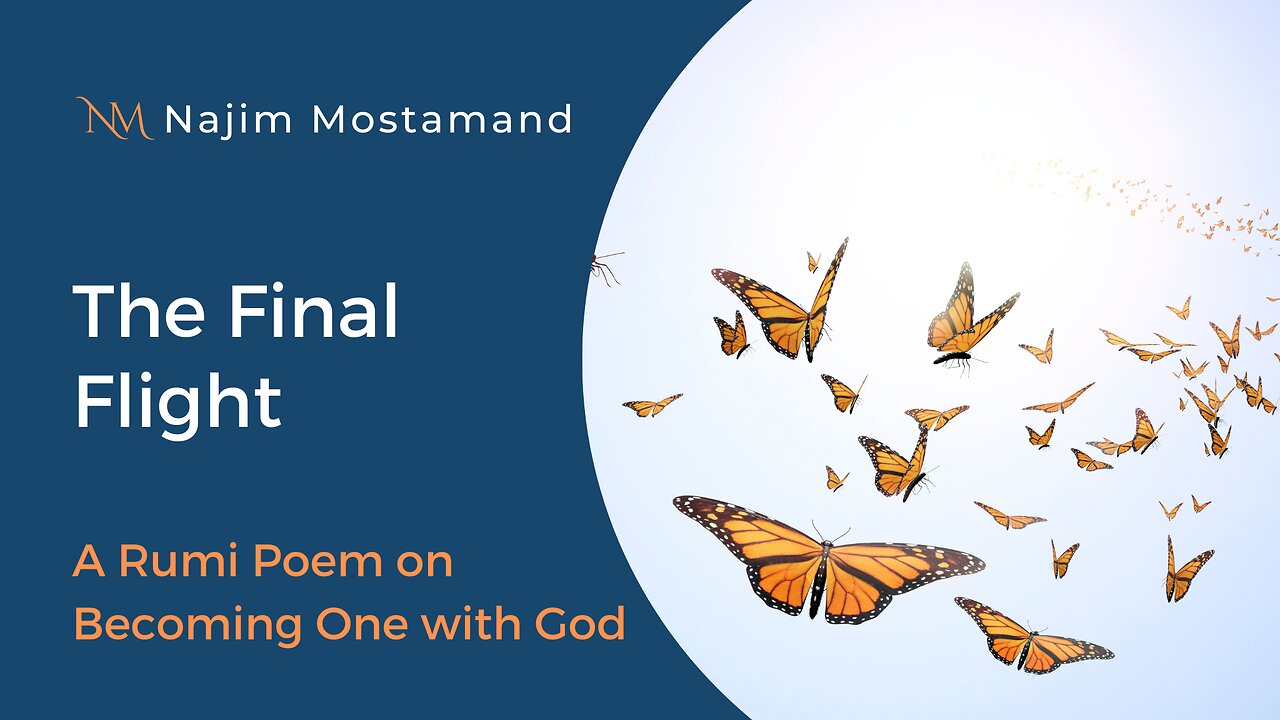Premium Only Content

The Final Flight – A Rumi Poem on Becoming One with God
Rumi's poems have incredible spiritual wisdom that we can apply to our daily life, and this one is no different.
The Final Flight is about the soul yearning to reunite and become one with God again. It talks about the struggles and sacrifices we must endure on our spiritual journey to truly achieve unity and oneness.
If you are craving to establish a deep connection with God and to experience this "inner unity," listen to this Rumi poem and interpretation. I am confident it will enhance your spirituality and help you on your awakening journey.
Please don't hesitate to reach out with any comments or questions, or if I can be of assistance in any way.
Hope you enjoy, and sending peace and love to all!
#rumi #rumipoetry #rumipoem
---
If you are looking for more inspiration, spiritual poetry, and ancient wisdom for awakening, please subscribe to my YouTube channel and follow me on social:
https://www.youtube.com/c/NajimMostamand
Website: https://najimmostamand.com/
Instagram: https://www.instagram.com/najimmostamand/
Facebook: https://www.facebook.com/najimmostamand1/
Patreon Donation Page: https://www.patreon.com/najimmostamand
Medium: https://medium.com/@namostamand
© 2023 Najim Mostamand
Music by Cousin Silas ("Shades of Autumn" and "Fading History")
Check out Dave's incredible music here:
https://cousinsilas1.bandcamp.com/
https://soundcloud.com/cousin-silas
---
This time I must confess,
I feel a total hate for myself.
While crowded and swarmed,
my heart wishes to be a single self.
Seeking that single pearl,
I crave to dive deep into this sea.
But fear of murderous waves
makes me beg for your help, my friends.
Scattered with so much going on inside,
I long for nothing but an inner unity.
Duality must be abandoned
if you seek to drink the soul of unity.
You must bet and lose
everything you’ve ever owned
if you truly desire
to become one with your Beloved.
Listen to the secret sound
of the revelation now
when your quest aspires the skies.
Fly away from this lowly earth.
My heavenly soul,
who only nests in the heights,
is tired of its house on earth.
It wants to abandon the body.
It wants to take the final flight.
~ Maulana Jalaluddin Rumi
—
Jalāl ad-Dīn Mohammad Rumi (1207 — 1273), also known as Jalāl ad-Dīn Mohammad Balkhī, Mowlānā, or more simply and popularly as Rumi, was a 13th-century Persian poet, scholar, philosopher, and Sufi mystic.
When Rumi was a young child, the Mongols, led by Genghis Khan, invaded Central Asia, forcing Rumi's family to escape westwards via caravan to avoid persecution and death. When Rumi turned 25, his father passed away and he felt a deep void in his spirituality. He followed his father's footsteps and took over the role of the Islamic molvi, or Muslim doctor of law. For roughly nine years, Rumi practiced Sufism under one of Baha ud-Din's disciples, Burhan ud-Din, who helped prepare him for an even greater spiritual encounter down the road. But it wasn't until November 15, 1244, that Rumi's life turned upside down.
On this day, Rumi met the wandering dervish and mystic Shams-e Tabrizi in Damascus, who transformed Rumi from an accomplished teacher, scholar and jurist to a humble ascetic. Shams (Farsi: the "Sun") saw Rumi's pride in having immense religious knowledge and fame, and threw Rumi's books on the ground, signifying that he knew nothing.
Under Shams' spiritual guidance, Rumi became introduced to divine love, music, poetry, and dance through the mystic Sufi practice of Sama. The two formed an inseparable bond, which is believed to have isolated Rumi from his students and family members, some of whom are said to have grown jealous of Rumi's companion. Two years after they met, Shams abruptly left Konya.
When Shams returned, however, he disappeared shortly after, with several sources suggesting that he was murdered at the order of Rumi's son Ala-eddin. His death sent Rumi reeling into depression, and to express and cope with his bereavement, Rumi began writing hundreds of lyric poems, which altogether formed The Divan of Shams-e Tabrizi (or Book of Shams of Tabriz).
The mystic dedicated the final 12 years of his life composing his epic masterpiece: the Masnavi-e Ma'navi (or "The Spiritual Couplets"). In December of 1273, he fell ill and passed away days later on December 17. Many refer to the day of his passing as Shab-e Aroos (or "Wedding Night") to signify that the mystic has finally united with his Beloved.
-
 8:22
8:22
Najim Mostamand
1 year agoLife is Short, But There's Something More Permanent...
612 -
 LIVE
LIVE
StevieTLIVE
1 hour agoFriday Night HYPE Warzone Games with Stevie
73 watching -
 LIVE
LIVE
SavageJayGatsby
22 hours agoLet's Play: Sea of Thieves | Friend Friday
93 watching -
 LIVE
LIVE
GritsGG
1 hour agoTop 250 Ranked Grind! Dubulars!🫡
59 watching -
 19:51
19:51
Robbi On The Record
23 hours agoElectronic Tattoos Measuring Thoughts? From iPhone to iSkin
22.3K15 -
 8:12
8:12
Hollywood Exposed
1 day agoJoy Behar Tried To Shame Tulsi Gabbard And Instantly FAILED
2.94K3 -
 17:03
17:03
IsaacButterfield
16 hours ago $1.80 earnedBritish Man ARRESTED for Saying ‘I Love Bacon’ to a Muslim!!
3.52K6 -
 LIVE
LIVE
The Sufari Hub
2 hours ago🔴SUFARI & JAMES TAKE ON THE UNDEAD - DYING LIGHT THEN THE FOLLOWING
9 watching -
 48:10
48:10
The Mel K Show
4 hours agoMel K & George Papadopoulos | Deep State Targets Rising: The Geopolitical Reality of Spy Gate | 9-5-25
13.9K -
 LIVE
LIVE
FusedAegisTV
1 hour agoFGC Friday w/Rance's Gaming Corner & JahBless | Tekken 8 Scrimmages
18 watching